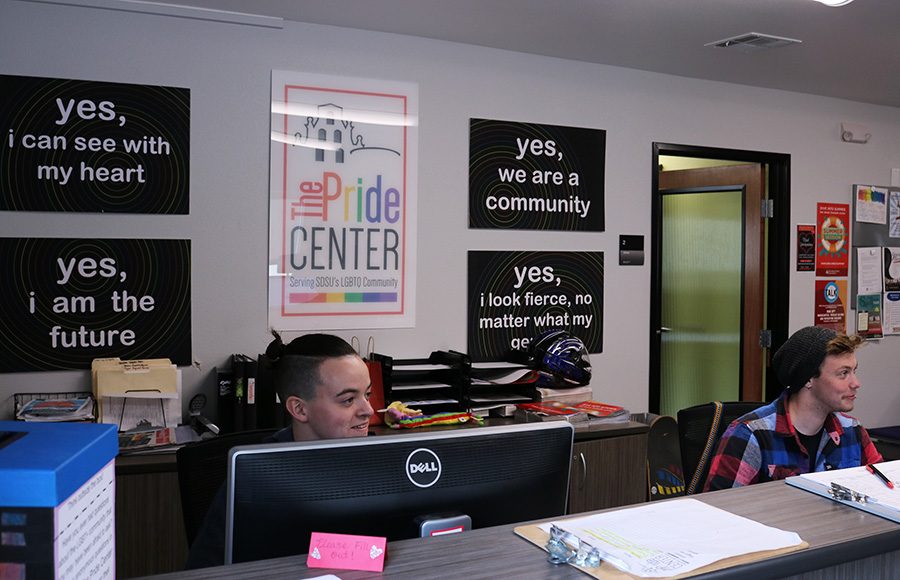The Pride Center and Movimiento Estudiantil Chicano de Aztlán co-hosted a presentation on Feb. 22 on the experiences of queer and transgender people of color at San Diego State.
The event was part of the Associated Students’ Student Diversity Commission two-week “Spring into Diversity” series, and took place at Montezuma Hall.
Center of Intercultural Relations Director and Co-Adviser of the Student Diversity Commission Edwin Darrell said the event was important in light of the national climate.
“It’s just really important students have a voice to share their perspectives, different information about their groups and also an opportunity for the campus community to learn about these perspectives as well,” he said.
The event began with a presentation of the history of queer and transgenfer people of color and current issues, such as their representation in history and media, as well as the possible effects of the Trump administration.
The presentation was followed by a panel of five queer or transgender SDSU students of color.
The panelists answered questions about their experiences as a QTPOC at SDSU, as well as within the transgender and queer community.
On the same day of the event, President Trump rescinded protections for transgendered students. Under the Obama administration, transgender students were allowed to use the bathroom of their choice. Although the panelists did not mention Trump’s reversal during the event, several panelists referenced the current political climate as a need for awareness for QTPOC issues.
“Specifically with LGBT issues, it’s only recently that we got gay marriage and now Donald Trump is president, sadly, and now all these things are possibly going to be turned over,” English senior and panelist Louys Christian said.
Interdisciplinary studies junior and panelist Shane James said he chose to be a part of the event because he had been a part of many different panels dealing with being queer and a person of color, but not many on his transgender identity.
“To be on this panel was really helpful in allowing people to understand my experience of being a queer trans person of color,” he said.
James said he wished more people with the individual needs he has would have attended the event.
“So they could at least have a person to identify with when thinking of ‘oh I don’t know a whole lot of trans people so I don’t have an investment in those kind of issues,’” he said.
James said his goal was to be vigilant.
“So people can be like ‘oh I know that person!’ and they think like ‘oh, bathroom issues, so that’s how this affects this kind of person or this friend, and I would hate for them to not have bathrooms and be discriminated against,’” he said.
James said the event was probably as successful as it could be at this current moment for SDSU.
“”When I look around this campus I see a lot of white people or white-identified people,” he said. “Because they don’t really experience those differences and those challenges and discrimination, because of being white and having that privilege, they wouldn’t necessarily see it as such a big thing to have to have these kind of events.”
James said he would love for the school events like the QTPOC mandatory for certain organizations or certain groups.
“I feel like if we continue these kind of conversations, then events like these can be even more successful and have even more attendance,” he said.
Christian, whose preferred pronouns are they/them/their, said it was important for them to use these panels to explain their story and explain why more knowledge of the QTPOC community is necessary.
“When you see SDSU, yes it’s diverse, but that diversity only correlates to a specific type of diversity, and its usually a bunch of white people and then like three people of color,” they said. “None of the LGBT folks get represented, none of the trans-folk get represented, and a lot of these salient identities are hidden behind this mask of diversity.”
After the panel, an attendee spoke to Christian about the struggles Christian went through as a Filipino immigrant and queer person of color.
“They said that they know people who are looking for a sense of community in those intersectionalities, and now that I have contact with this person I can create that space for them and for me,” Christian said.
Christian said queer and trans people of color need to find other queer and trans people of color to affirm each person’s struggles.
“These communities, these friends that we make are extremely important because that’s how we create change, that’s how we create power within ourselves and other people,” Christian said.
Pride Center Community Outreach Assistant and event organizer Alejandra Tostado said the panel was the first of its kind ever held by the Pride Center.
“We felt like the Pride Center in the past has not catered specifically to queer trans people of color in the spaces,” she said.
Tostado said she was glad the people in the audience included many members of the POC community or were queer as well.
“One of my worries was that this event was going to be tokenized by certain Greek councils as fulfilment or accreditation,” she said. “This space was what I wanted because … people were able to ask questions and interconnect people that normally wouldn’t come into these spaces.”
Tostado, who identifies as QTPOC herself, said the goal for the Pride Center is to re-direct its programs and events to cater to everyone, including racial backgrounds.
“We are done being a group within the queer-trans community,” she said. “We’re done being tokenized.”












